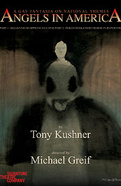Robin Weigert on Her Heavenly Journey with Angels in America
About the author:
Fans of Robin Weigert’s Emmy-nominated performance as a drunken Calamity Jane in the much-missed HBO series Deadwood can now get a very different view of the stage-trained actress, as she crashes through Prior Walter’s ceiling in Tony Kushner’s Angels in America. As the apocalyptic Angel, Weigert imparts some of the play’s biggest ideas about life and death. Luckily, she comes to Signature Theatre Company's smash-hit off-Broadway revival with more than a passing knowledge of Kushner’s writing: Eight years ago, she played the Mormon Mother in director Mike Nichols’ acclaimed miniseries adaptation of Angels. Weigert took time from her super-busy performance schedule to share her journey with the play—and her deepening understanding of the Angel’s message—with Broadway.com.
![]()
The first time I spoke the words of the Angel out loud in front of other people was in 2002, at a table read for the HBO miniseries of Tony Kushner’s play. Emma Thompson had been unable to attend, and Mike Nichols asked me if I would read her parts in addition to the part I’d be playing, that of the Mormon Mother. I didn’t have a clue what I was saying. I was mostly terrified that every time the Angel said “I” she said it four times in a row, and I hoped that I could skate by somehow on good locution. I’ve known Ben Shenkman, who was cast as Louis, since we were five and six years old, respectively; with the exception of college, we even went to the same schools. I tried to take strength from the fact that he was in the room with me, as if I couldn’t be quite as much of the interloper I felt I was if he was there, too.
Truth be told, I would have felt less like an interloper if I had been asked to read Harper. That was a part I had broken my heart over, but it had also earned me a place at that table. I had read her lines for Mike and Tony many times and felt I knew her inside and out. When Mike asked me if I’d read the Angel that day, I’ll confess I was horrified. Now he’ll see, I thought. Now he’ll realize I don’t know what the hell I’m doing after all.
A lot has happened in the last eight years, in my life and in the world. Since I first encountered the Angel, the issues of the day have shifted and there is a new urgency to resolving the tension between revolutionary and reactionary impulses. Since that first encounter I have aged eight years, my career blossomed and I experienced more hope than I ever had before. I also experienced a number of profound disappointments and losses, including the death of my father, and had begun to feel what it was like to value safety and consistency over exploration and adventure.
When I was asked to audition for the Angel in Michael Greif’s off-Broadway production at Signature Theatre, I was a little intimidated. I remembered reading her words in that thrilling room all those years ago. I remembered the excitement and the terror. I also remembered my own incomprehension. I was amazed, as I worked on the material, to find how much my relationship to those words had changed. Suddenly, I knew her. I understood what it felt like to want things to stop moving. I understood what it was to want God to come back and inhabit the heaven He’d abandoned. I understood what it felt like to look into the end of things. Suddenly that language had a home in me, and I was so grateful for the chance to return to it after all this time and recognize something about the distance I have come.
In the Epistle, the Angel says to Prior, “You Know Me Prophet: Your battered heart,/Bleeding Life in the Universe of Wounds.” I love this line. I think it was through this line that I found my way inside the character. I realized what I’m actually telling Prior is, by this you know me: You know me by your pain. I’m also implicitly letting him know that by our shared pain, we know each other. The wonderful thing about this moment is that the Angel believes she’s trumped Prior, and the truth is that she’s giving him the means to trump her.
It’s ultimately because of the compassion born of shared suffering that the Angel can’t help but relent and give him her blessing. Because the Angel suffers—and she does, terribly, in the absence of God—she, like Prior, is connected to the suffering of the world. Even if her vision of the future is apocalyptic, she cannot help but feel compassion. And compassion is, in the end, the world’s greatest source of hope.
